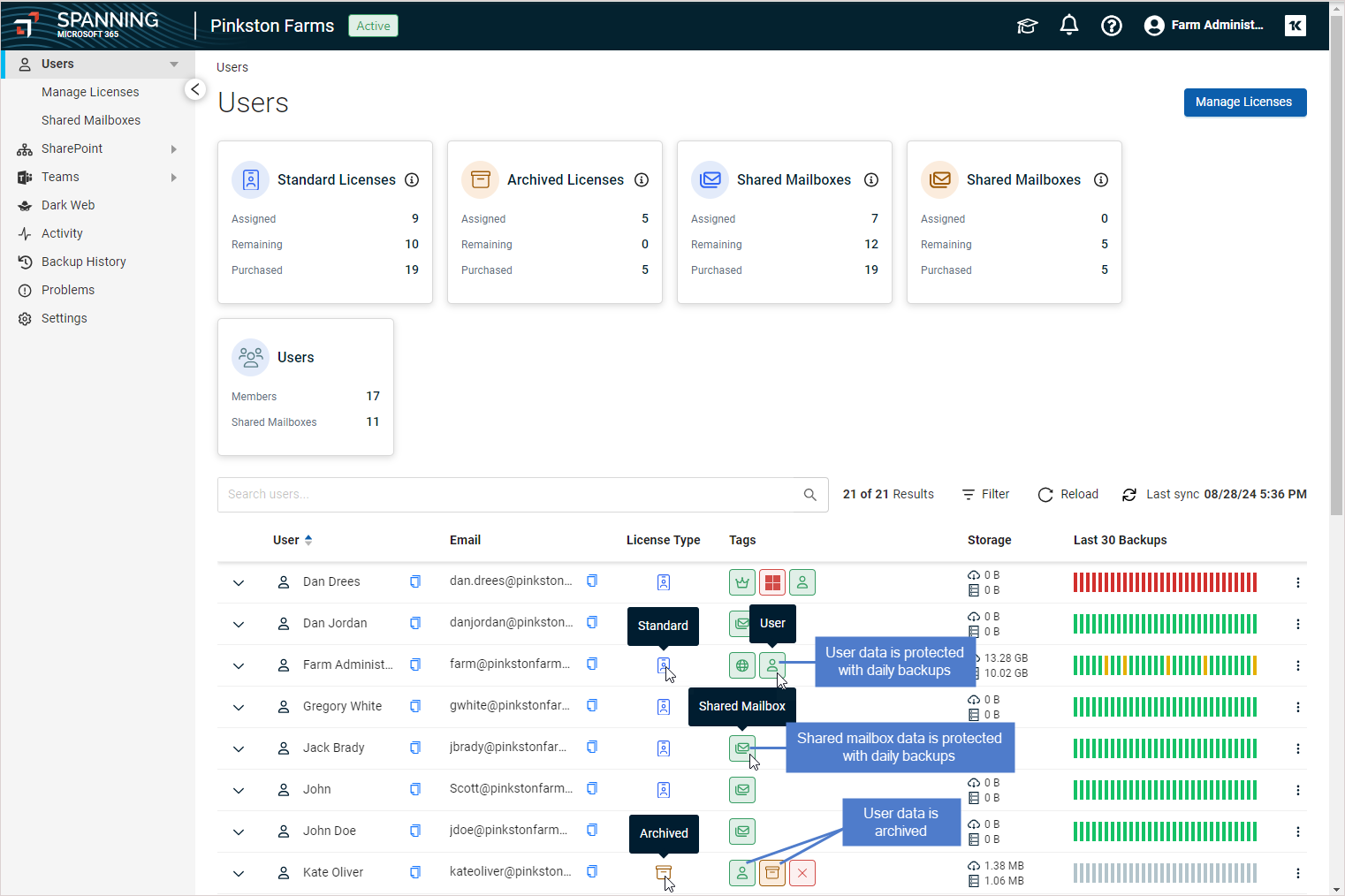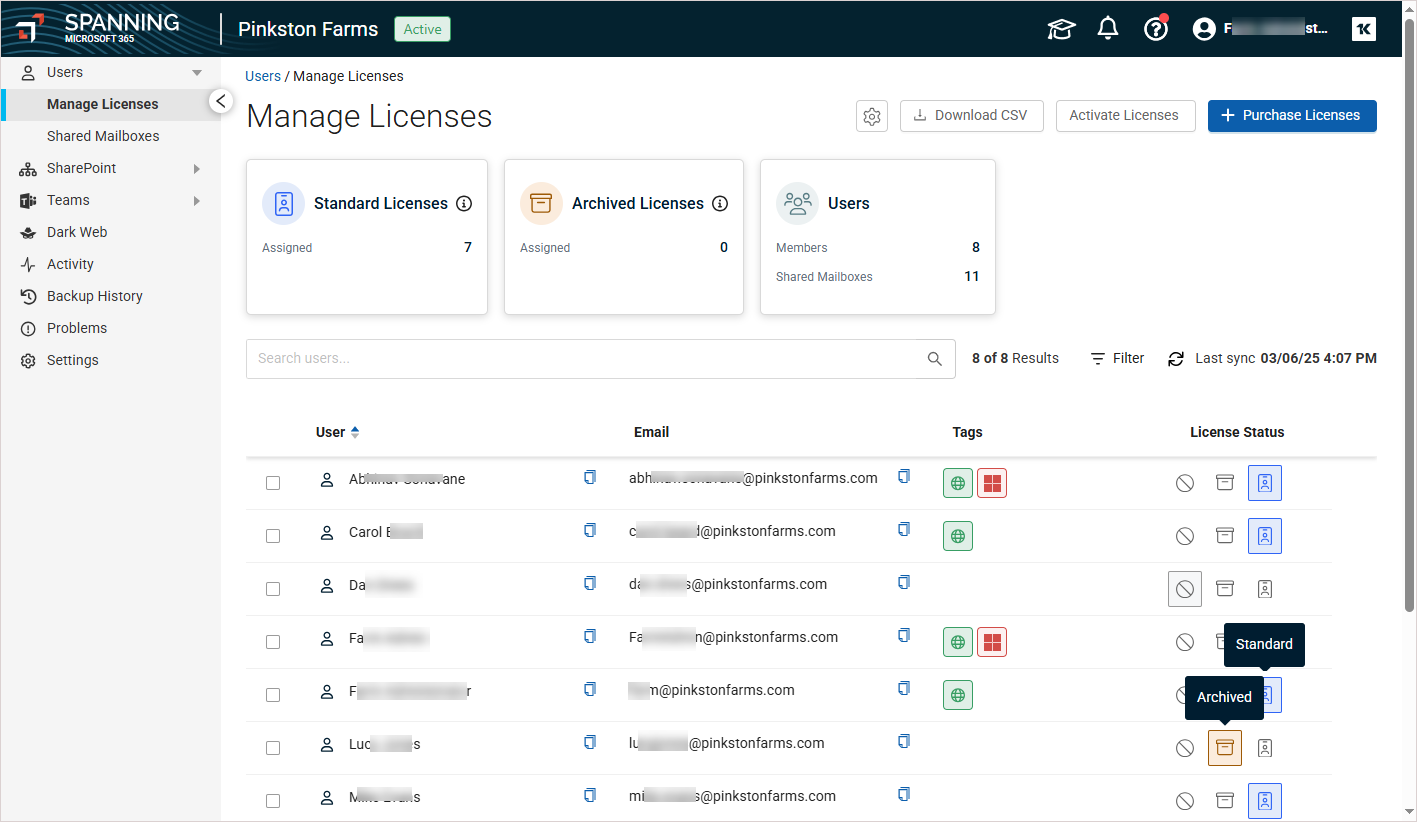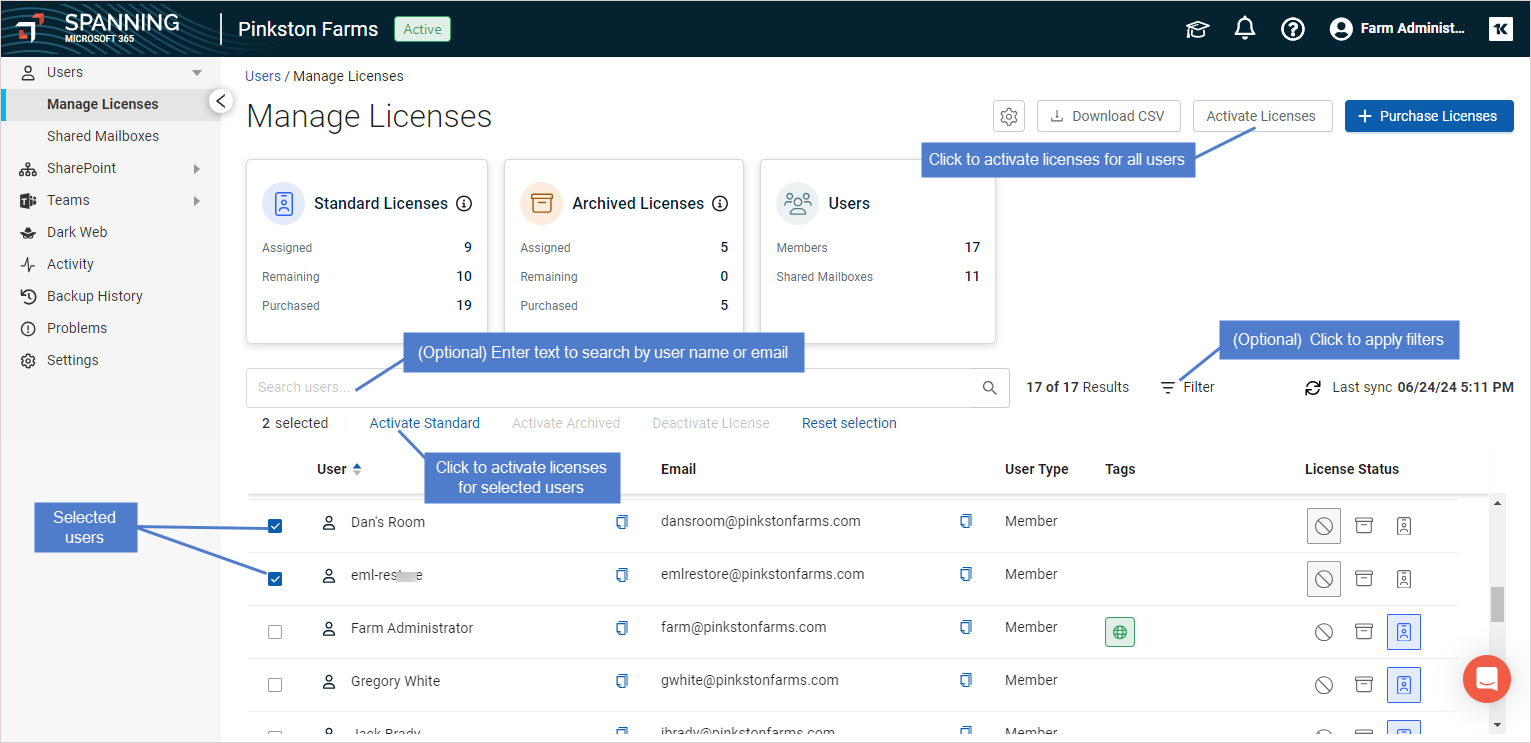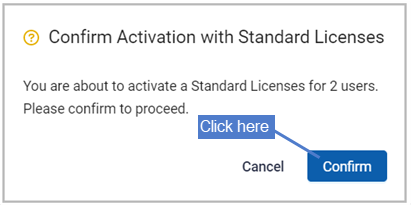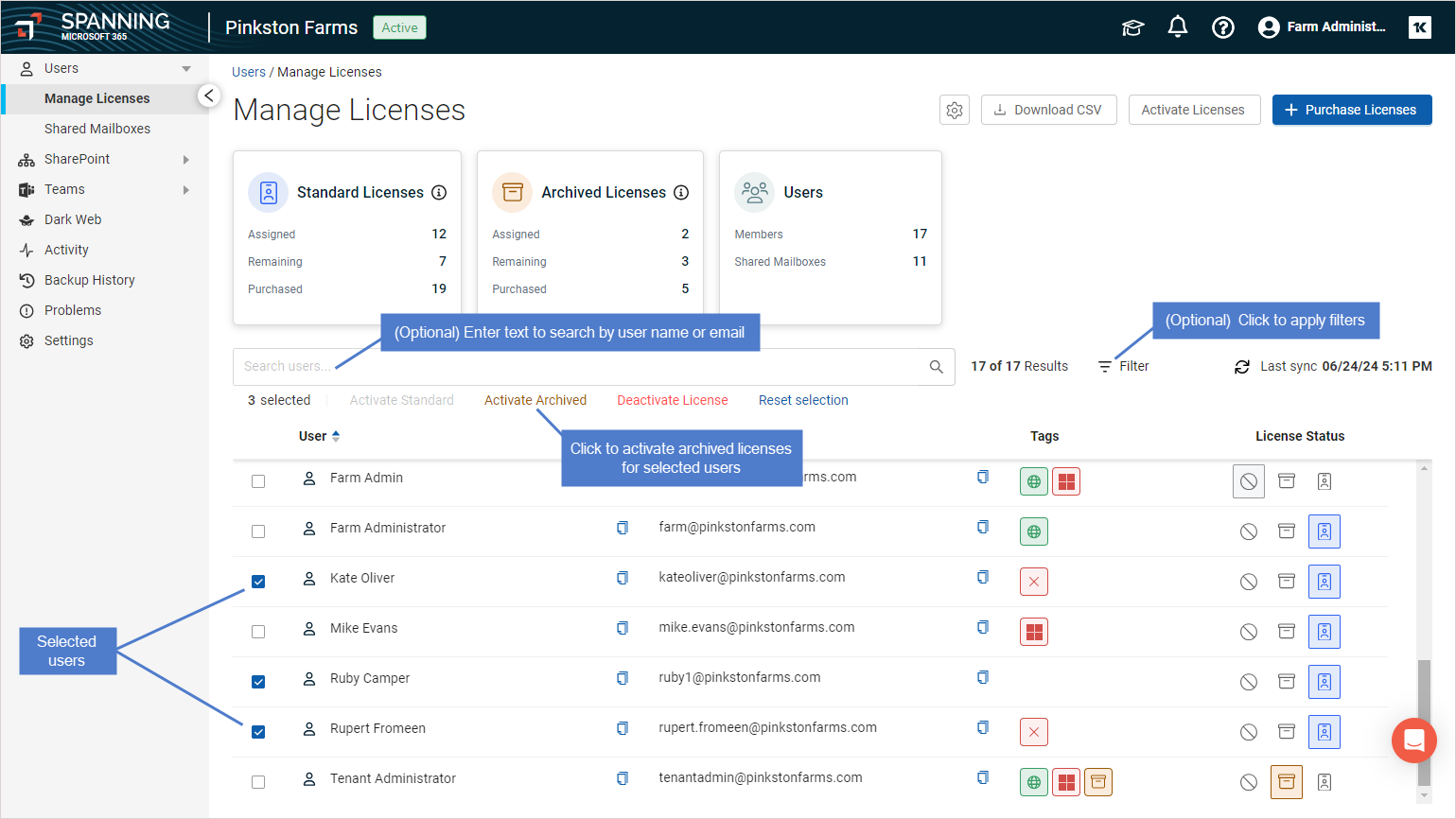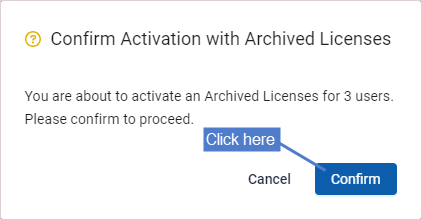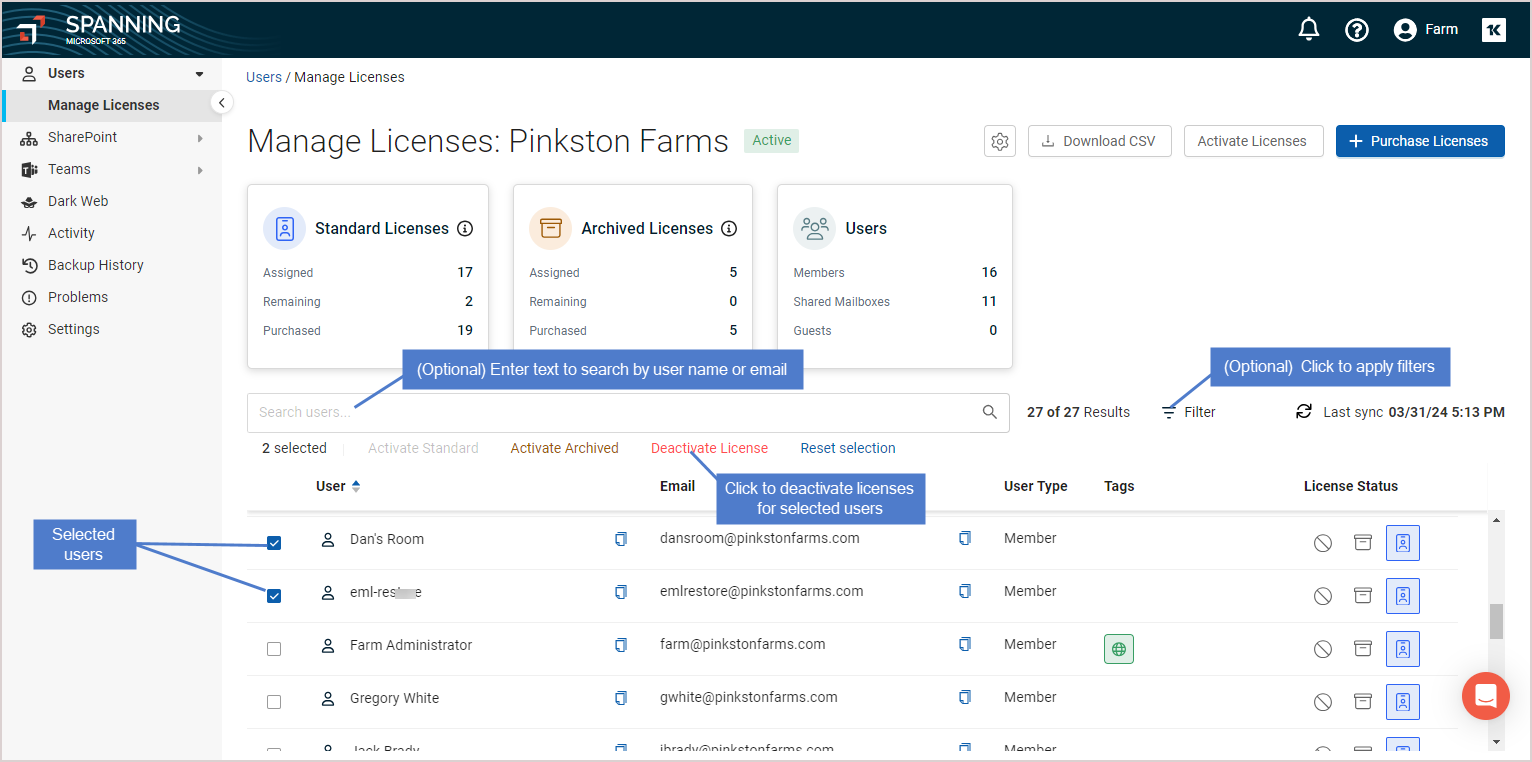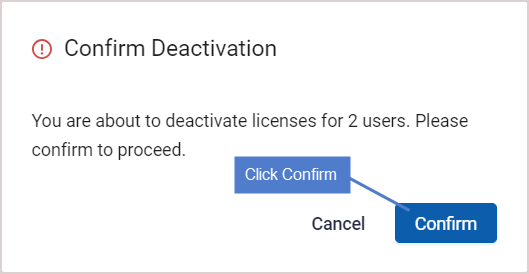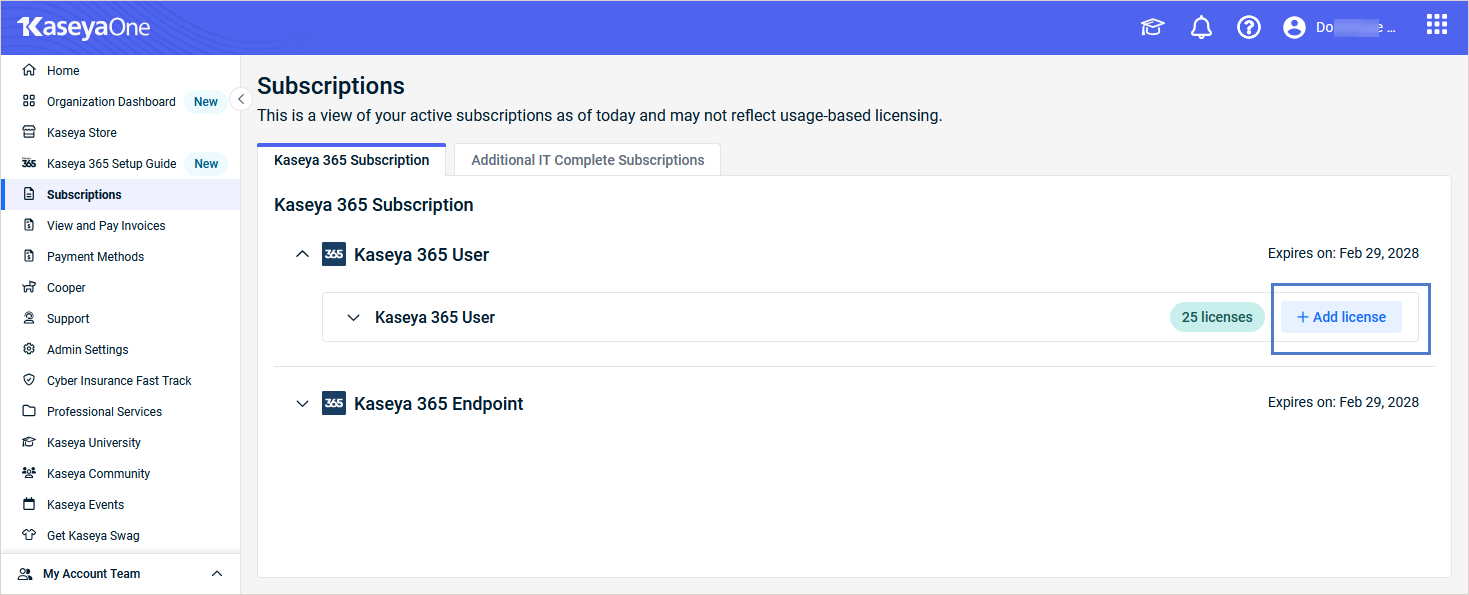Spanning Backup protects the data of each licensed user. Spanning users can be licensed with a standard license or an archived license. If a standard license is applied, Spanning runs daily backups of the user's Mail, Calendars, Contacts, and OneDrive data. If an archived license is applied, any existing Spanning Backup data is retained but no new backups are run.
- Spanning also protects shared mailboxes and SharePoint site collections— for free.
- Shared mailboxes for Spanning Backup and Kaseya 365 subscriptions – Spanning Backup includes unlimited protection for shared mailboxes. To run daily backups you must select specific shared mailboxes to protect, as described in To protect shared mailboxes.
- Shared mailboxes for Legacy Spanning subscriptions – You can protect one shared mailbox for each standard user license purchased. You can archive one shared mailbox for each archived license purchased. For details, see Protecting shared mailboxes.
- SharePoint backups – Spanning backs up the document libraries and files contained within site collections in SharePoint. To run daily SharePoint backups you must select specific site collections to protect, as described in To select site collections to back up.
Consider the following when working with user licenses:
- Standard user licenses are independent and unique from archived user licenses. These licenses are tracked separately and purchased separately.
- When an archived license is applied, the user's standard license becomes available for application to another user.
- When a Spanning license is unassigned, the user's backup data is removed permanently after 60 days.
- If a standard license is reapplied within this 60-day period, backups resume and data is preserved based on the organization's current retention settings. (The next backup could take longer than usual, depending on how long the user was unlicensed and the rate of changed data.)
- If an archived license is reapplied within this 60-day period, data is preserved but no new backups are run.
- Standard licenses cannot be "converted" to archived licenses in the Spanning Backup UI. Please contact your Account Manager for more information if you have a significant volume of deactivated users to manage.
To manage Spanning licenses as your user community changes over time, you will need to do the following:
- Assign standard licenses to new users to start protecting their data. Spanning backs up this data for each licensed user: Mail, Calendars, Contacts, and OneDrive.
- Deactivate licenses of users whose Spanning data you no longer want to protect or retain.
- Assign archived licenses to users to retain their existing Spanning data but stop running new backups.
- Purchase standard and archived licenses as needed to protect additional users.
You can also use Spanning's automated licensing features to do the following:
- Automatically protect new users in your tenant with standard licenses by enabling group-based licensing and automated license purchasing. This is especially useful if your organization is growing very rapidly or has a lot of rotation in staffing. For details, see To configure Auto-Protection settings.
- Automatically apply archived protection to Spanning Backup users and shared mailboxes that have been deleted from your tenant by Microsoft. For details, see Auto-assigning archived protection to users and shared mailboxes deleted by Microsoft.
NOTE The summary tiles that you see at the top of the Users, Manage Licenses, and Shared Mailboxes pages differ by subscription type. Other content on these pages is the same for all subscriptions. The procedures in this article apply to your subscription— even if your summary tiles look different than the example screenshots.

Use these procedures to manage user licenses:
It is easy to identify whether users are licensed with a standard license or an archived license by viewing the License Type column and the user's tags. This information displays on the Users page and on the Manage Licenses page.
NOTE The  tag indicates the user's Mail, Calendars, Contacts, and OneDrive data is being protected by a standard or archived license. The
tag indicates the user's Mail, Calendars, Contacts, and OneDrive data is being protected by a standard or archived license. The  tag indicates the user's shared mailbox data is being protected (for details, see Protecting shared mailboxes).
tag indicates the user's shared mailbox data is being protected (for details, see Protecting shared mailboxes).
You must license the user accounts that you want to protect with Spanning Backup. Once standard licenses are assigned, Spanning begins running daily backups of each licensed user's Mail, Calendars, Contacts, and OneDrive data.
Use one of these methods to assign standard licenses:
- Use the Manage License interface as described in To assign licenses via the interface.
- Utilize the API to assign and remove licenses from users as described in To manage user licenses via the API.
- For assistance with large-scale license assignment, see KaseyaOne support.
- To assign licenses using PowerShell, follow the instructions in this article: How can I assign Spanning Licenses with PowerShell?
- Set up automated license purchases and assignment to newly-onboarded users as described in To configure Auto-Protection settings.
- Log into Spanning Backup for Microsoft 365 at https://o365.spanningbackup.com as an admin user.
- Click Users > Manage Licenses.

- (Optional) Search for users by name or email address.
- (Optional) Search for users by using the advanced filters. This enables you to search across all columns and values on the page.
- (Optional) Check boxes to select users.
NOTE Spanning automatically refreshes the user list once per day to search for new users in your Microsoft 365 tenant. If you do not see a newly added user, click ![]() to manually sync new users from your Microsoft 365 tenant.
to manually sync new users from your Microsoft 365 tenant.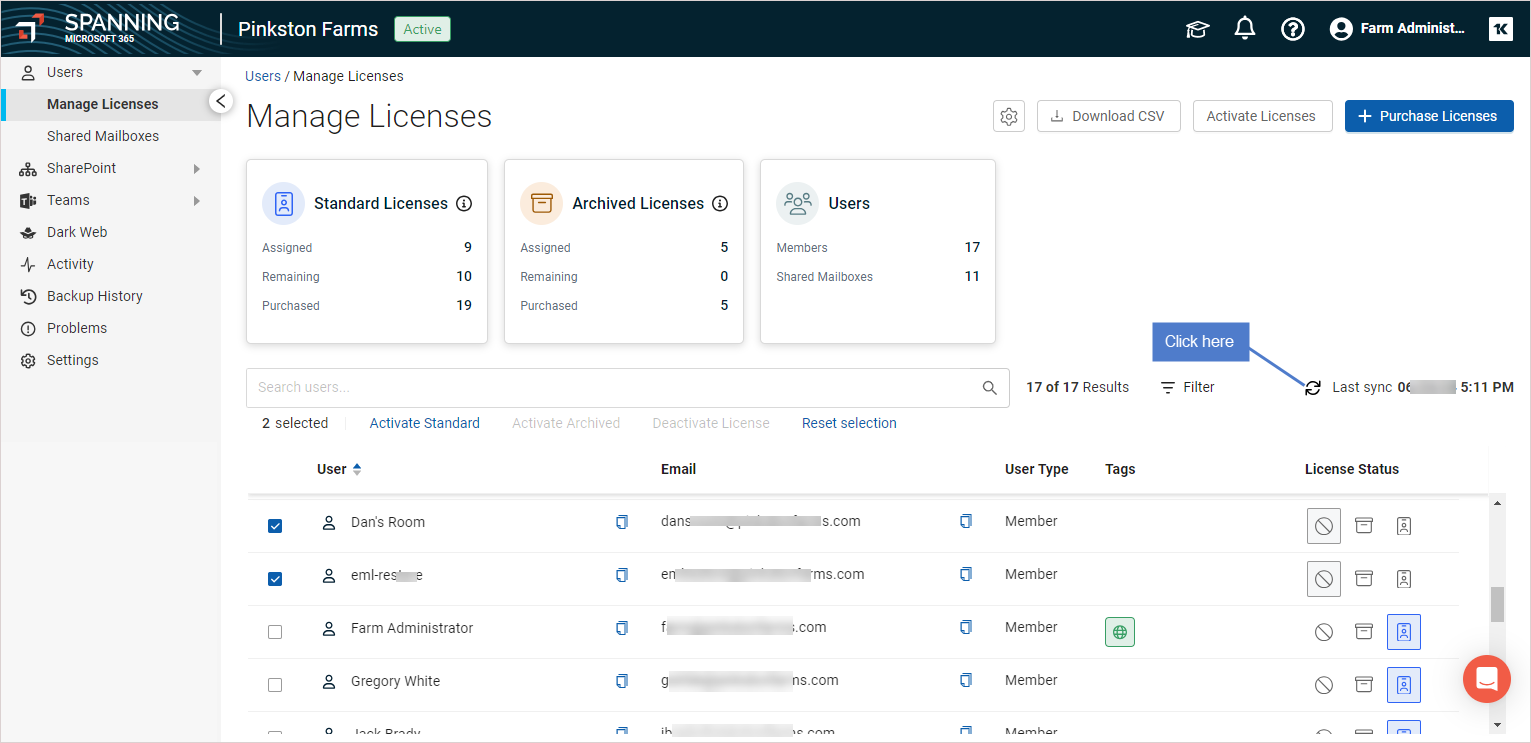
- Do one of the following:
- To assign licenses to selected users, click Activate Standard.
- To assign licenses to all users that meet current filter criteria, click Activate Licenses.
- You can enable backups for all users in your tenant in one action by clicking Activate Licenses (when no filters are currently applied). If filter criteria are applied (e.g., desired User Type), this action takes into consideration all filtered results (not only the users loaded in the list below if the list contains more).
- If an Insufficient Licenses message displays, you don't have enough licenses for the selected users. Do any of the following: select fewer users, purchase more licenses, or deactivate licenses to reduce the number of assigned licenses.
To use the API, a Spanning administrator must generate an API token to use for each call made.
To generate an API token:
- Log into Spanning Backup for Microsoft 365 at https://o365.spanningbackup.com as an admin user.
- Click Settings. Select the Backup & Security tab.
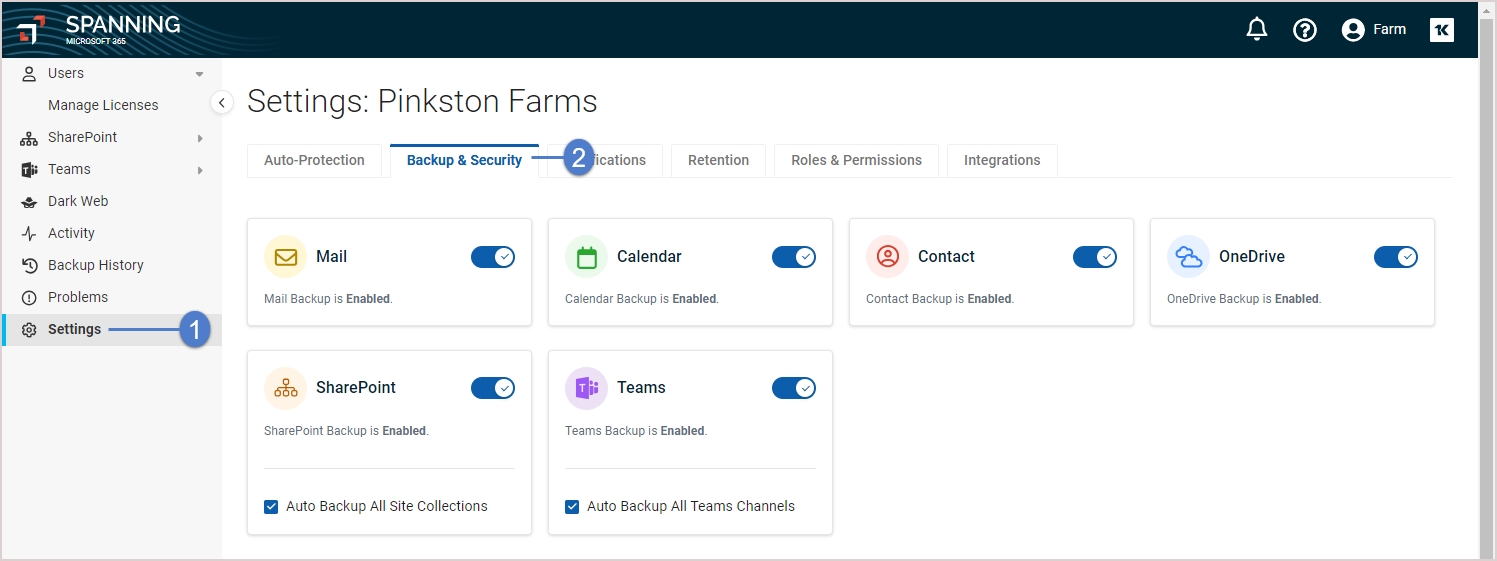
- Scroll down to the API Token section. Click Generate token.
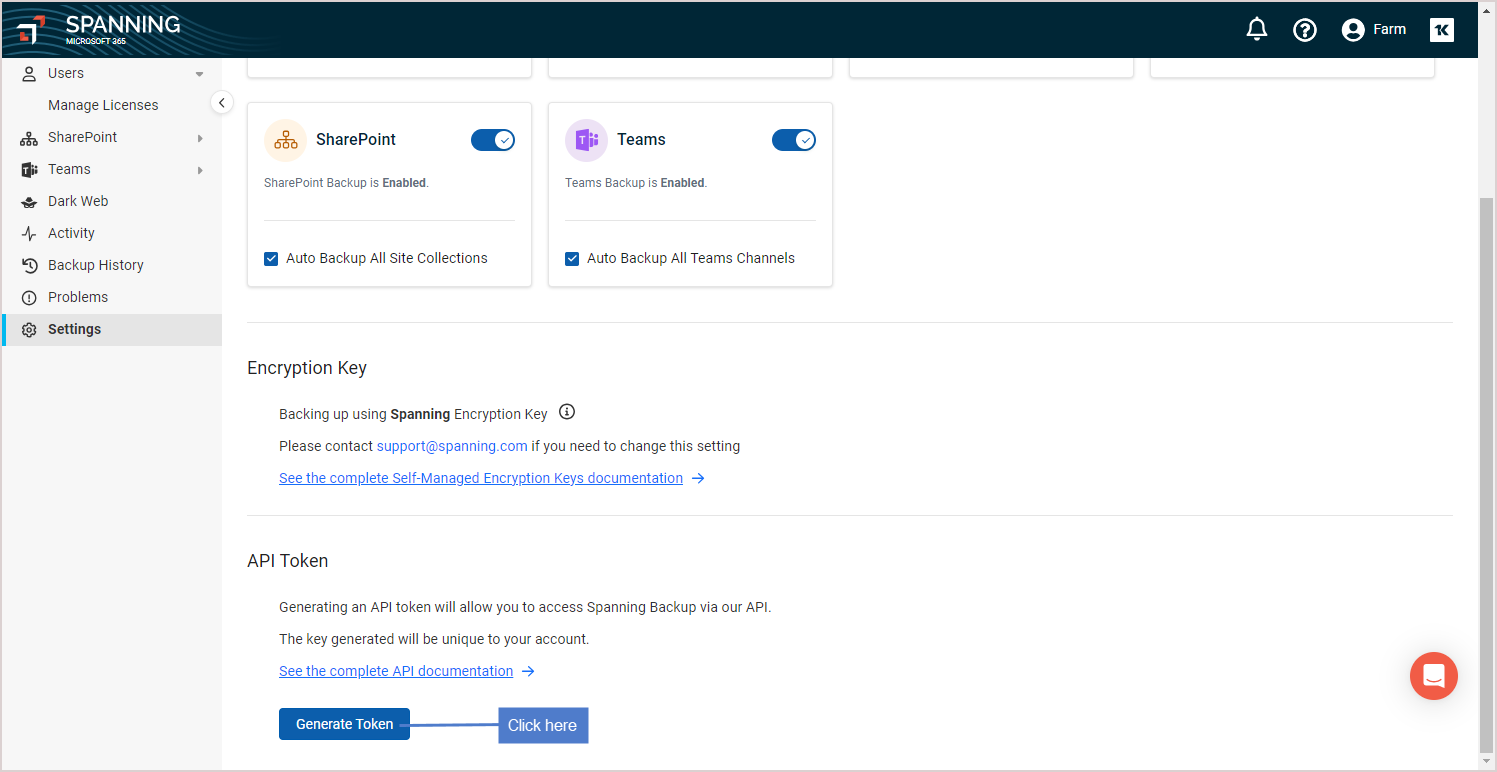
- The token is generated. Copy and save the token. You will need to supply this token for all API calls. For details on working with the Spanning API, see Spanning Backup for Office 365 API.
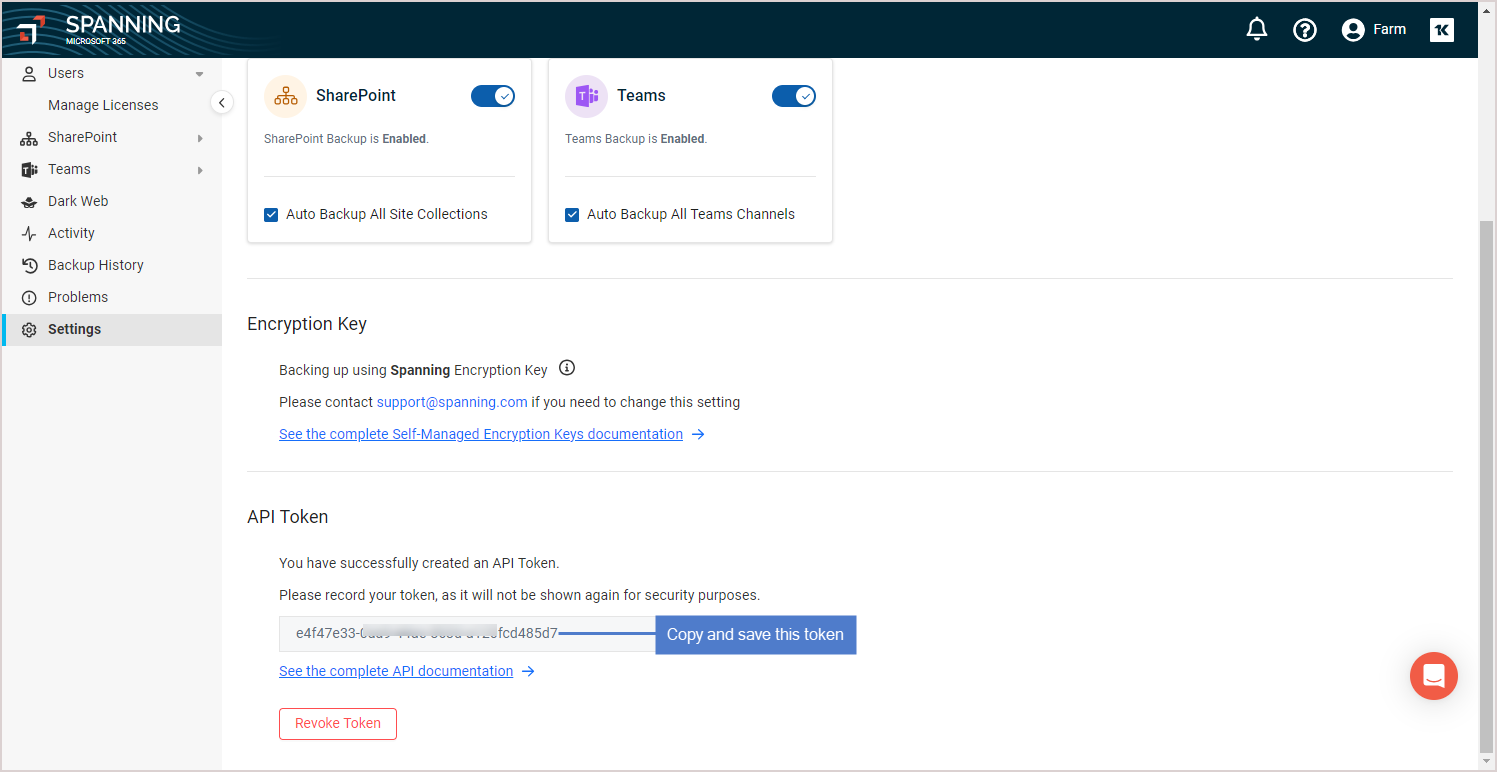
An archived license enables you to retain a user's existing Spanning data but stop running new backups. Apply an archived license rather than deactivating a user license to prevent the user's data from being deleted.
To assign archived licenses to users
- Log into Spanning Backup for Microsoft 365 at https://o365.spanningbackup.com as an admin user.
- Click Users > Manage Licenses.

- (Optional) Search for users by name or email address.
- (Optional) Search for users by using the advanced filters. This enables you to search across all columns and values on the page.
- Check boxes to select users.
- Click Activate Archived to assign archived licenses to selected users.
NOTE If an Insufficient Licenses message displays, you don't have enough archived licenses for the selected users. Do any of the following: select fewer users, purchase more licenses, or deactivate licenses to reduce the number of assigned licenses.
Spanning's archived protection is used to retain the backups of users and shared mailboxes.
On the Settings > Auto-Protection > Archived Licenses Settings tab, enable the Automatically assign Archived Licenses for deleted users and shared mailboxes option to automatically assign archived protection to deleted users and mailboxes.
If Automatically assign Archived Licenses for deleted users and shared mailboxes is enabled:
-
When a user that is being actively protected by Spanning Backup is deleted from your Microsoft 365 tenant, an archived license is automatically assigned to the user (if one is available). The user's standard license is removed and becomes available for application to another user.
If no archived license is available in your environment, the deleted user will continue to be protected by their standard license. Existing backup data is retained but no new backups run because the user has been deleted from Microsoft 365.
-
When a shared mailbox that is being actively protected by Spanning Backup is deleted from your Microsoft 365 tenant, archived protection is applied to the shared mailbox as follows:
Spanning Backup and Kaseya 365 subscriptions – These subscriptions include unlimited protection for shared mailboxes. Archived protection is applied to all deleted shared mailboxes.
Legacy Spanning Backup subscriptions – For each archived license purchased you can archive one user and you are allocated archived protection for one shared mailbox. Archived protection is applied to the mailbox as long as the amount remaining in your Shared Mailboxes Archive Pool is greater than zero:
Not sure which subscription you have? See Do I have unlimited shared mailbox protection?
- Any backup data collected prior to the deletion of the user in Microsoft 365 or the assignment of the archived license (whichever comes first) can be restored to another user or exported.
- Automated licenses purchase for archived licenses will be included in an up-coming release. This feature will bring capability to automatically provision a license for your deleted users when they are identified during a Microsoft 365 tenant sync and assign archived licenses immediately, without needing to purchase archived licenses ahead of time.
Consider the following before deactivating licenses:
-
Standard user license – A user's Spanning data is removed permanently 60 days after deactivating their license. If a standard license is re-applied to the user during this 60-day period, data is retained and daily backups resume.
-
Archived license – A user's Spanning data is removed permanently 60 days after deactivating their archived license. If an archived license is re-applied to the user during this 60-day period, data is retained.
Use this procedure to unassign and deactivate licenses for selected users.
- Log into Spanning Backup for Microsoft 365 at https://o365.spanningbackup.com as an admin user.
- Click Users > Manage Licenses.

- (Optional) Search for users by name or email address.
- (Optional) Search for users by using the advanced filters. This enables you to search across all columns and values on the page.
- Check boxes to select users.
- Click Deactivate License.
Once your Spanning Backup account is set up as a paid account, you can purchase additional licenses at a prorated annual rate. You can purchase licenses manually or opt to automate license purchases and assignment to newly-onboarded users.
- To manually purchase more standard user licenses or archived licenses:
For standalone Spanning Backup subscriptions, click Purchase Licenses on the Manage Licenses page. Log in to the Kaseya Portal and place your order.
For Kaseya 365 User subscriptions – Purchase additional licenses through the Subscriptions page in KaseyaOne. For details, see KaseyaOne Subscriptions page.
- To set up automated licensing, see To configure Auto-Protection settings.
You can assign your newly purchased licenses to users as described in To assign licenses via the interface.
Shared mailbox protection for Legacy Spanning Backup subscriptions
For Legacy subscriptions, purchasing standard user licenses and archived licenses enables you to protect additional shared mailboxes. For every standard user license purchased, you can protect one shared mailbox for free. For every archived license purchased, you can archive one shared mailbox for free.
You can assign your newly purchased licenses to users and add protection to shared mailboxes in your tenant:
- Use the Manage Licenses page to assign licenses to users (see To assign licenses via the interface).
- Use the Shared Mailboxes page protect shared mailboxes (see To protect shared mailboxes).
To ensure newly on-boarded users are protected, Spanning Backup for Microsoft 365 supports the ability to automatically purchase standard licenses when needed and assign them to new users. For details, see To configure Auto-Protection settings.
